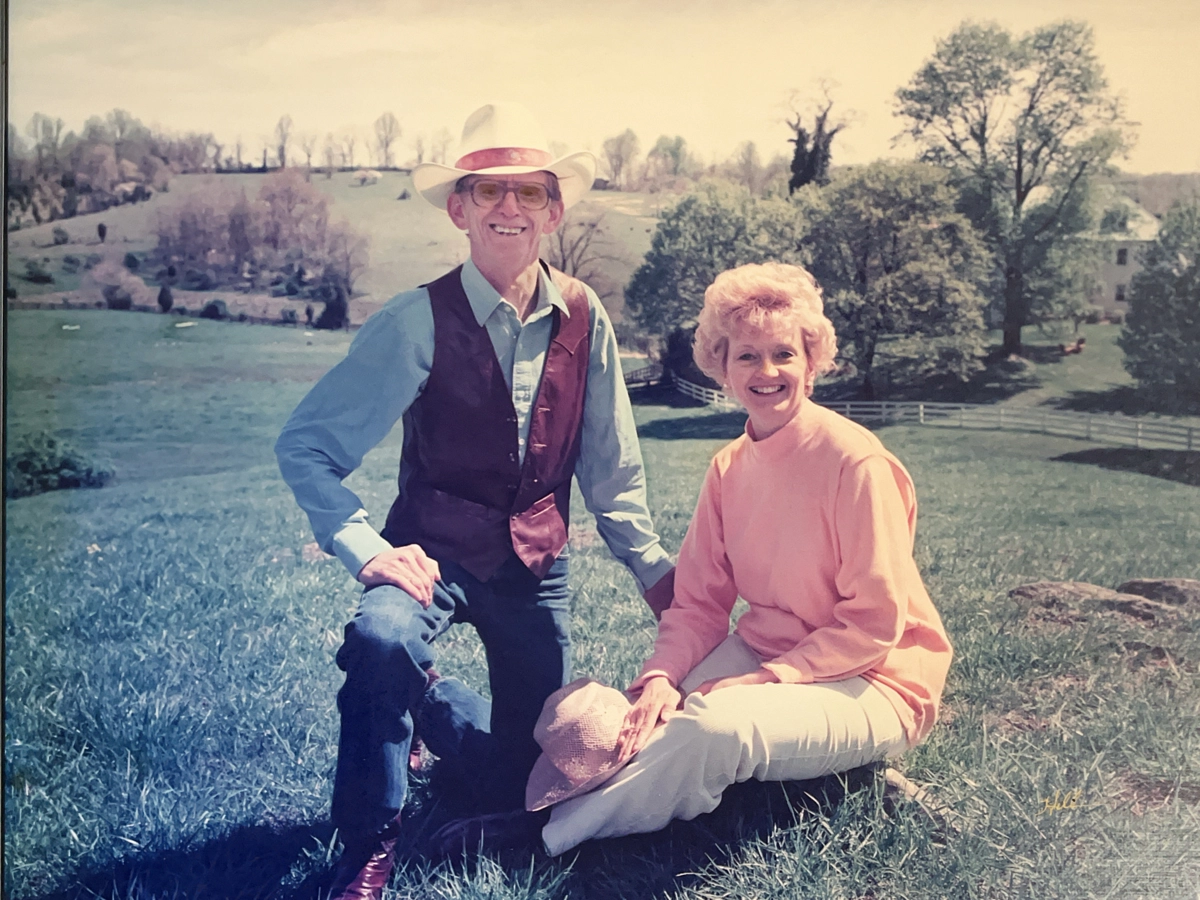“The souls of the righteous are in the hand of God, and no torment will ever touch them. In the eyes of the foolish they seemed to have died, and their departure was thought to be an affliction, and their going from us to be their destruction; but they are at peace. For though in the sight of men they were punished, their hope is full of immortality. Having been disciplined a little, they will receive great good, because God tested them and found them worthy of himself; like gold in a furnace he tried them, and like a sacrificial burnt offering he accepted him.”
Wisdom 3:1-6
It was five years ago that I read these words at the funeral mass for my grandmother. It was only nine months ago that my brother read these same words at the funeral mass for our grandfather.
Since reading this passage on that gray, rainy fall day in 2018, when we laid my sweet grandma to rest, these words have stayed with me. They resurface typically at some point in the daily mass readings throughout the year and, when they do, I’m brought back to that moment.
Knowing how my grandmother suffered with aches and pains, illness and fears, it is ever-consoling to meditate on these words that were proclaimed when we commended her soul to God. To us, she surely seemed afflicted with many ailments; to us, she certainly seems to have gone from us.

And to say her departure was an affliction would be putting it lightly — she was a ray of sunshine, sweeter than honey to all who knew her! The kind of person you would give just about anything to be with once again — what I wouldn’t give to hold her hand once more, to sit with on the front porch on a lazy summer afternoon, to hear her singing, “Oh, What a Beautiful Mornin’” one more time as she prepares for the day, beaming from ear to ear. There’s no replacing her.
Can it be true that God found her worthy of himself? That she is truly like gold, purified by the trials she endured with strength? Are we, in our grief, truly the foolish ones here?
In those four years between the death of my grandmother, Janet, and the love of her life, my grandfather, Red, I found my heart captured by the book of Wisdom (if you’ve never read it, take this as an invitation to dive in, and start at the beginning!).
The “wisdom literature” in the Scriptures are aptly named for they offer nothing if not wisdom, finely packaged in poetic verse and song. And packed full of profound insight are they. They provide instruction and counsel about the ways that lead to fullness of life and those that lead to darkness and death. The above passage has remained dear to me, but when I finally read the entirety of the Wisdom of Solomon, I came to deeply love the whole book.
The Wisdom of Solomon sings the glory of wisdom and of her friends, those who love her and live in her ways. Wisdom is “radiant and unfading” (6:12), she is “a reflection of eternal light, a spotless mirror of the working of God and an image of his goodness” (7:26). What glory! What majesty. Within her is found every goodness, every beauty, every virtue. Even immortality.
Yes, there is everlasting life offered us after this earthly life, but there is something immortal about virtue. Something about virtue is everlasting and we experience a taste of immortality when we meet it, even in this life. As the book of Wisdom puts it, “In the memory of virtue is immortality, because it is known both by God and by men. When it is present, men imitate it, and they long for it when it has gone; and throughout all time it marches crowned in triumph, victor in the contest for prizes that are undefiled” (Wisdom 4:1-2).
The book of Wisdom asserts that virtue is immortal, in some sense because it is memorable.

When virtue—those habits, behaviors, dispositions of excellence exhibited in the lovers of wisdom—is present, men imitate its goodness. When it’s gone, it leaves a terrible hole and a longing in the hearts of those who knew with it. And yet, as the Scriptures read, it marches in triumph, for all time! Adorned with the crown owed to the victor who has competed well, who has run the race.
We hope, we pray, we strive that, after our death, we might enter life everlasting in paradise with the One who has known us from the beginning. But, even here on this earth, we can taste the goodness of pure life, of life without decay, of life untouched by death, when we encounter the presence of virtue. And that presence, in some sense, lives on in the memory of virtue. Those who knew it, and remember it, still have a semblance of pure life, whole life with them in their memory, even when it is gone. “In the memory of virtue is immortality, because it is known both by God and by men.”
It wasn’t until the passing of my dear grandfather this past fall that this passage, and its meaning, impressed itself more deeply into my mind and heart. His life, one of virtue, persists in the memory of many people, those who loved him deeply and for a long time, and those who encountered him but only for a time. At his passing, stories flooded in to our family, through social media, texts, notes, phone calls. Many folks, far and wide, wanted us to know that he had meant something to them, that his life had touched theirs, even in a small way, even a long time ago. To him, every person he encountered was someone worth knowing. And the dignity he perceived in you was reflected back to you in his tender care. His life was a memorable one, most especially because of his virtue and his companionship with wisdom.

His death was grace-filled. Early on the feast of Christ the King, he left this world as two of his grandsons sang to him his favorite country western tunes. With his departure went a huge part of the hearts of all privileged enough to love him. While the delight of his heart, my grandma, was warmth and joy, my grandfather, her favorite cowboy, was tender, steady love. He was strong and firm, more intelligent than anyone I’ve ever known, always armed with a witty reply or a story which testified to the agility and tenacity of his mind, even in his late 80s. And yet, his strength and his wit were only outdone by his love. His heart loved so deeply that any time he tried to express it in words, he could not stop the flow of tears. He, too, is irreplaceable.
Both Janet and Red were of a generation where virtue was held in high esteem. Children of the Depression, born in the years that the Dust Bowl ravaged the Great Plains, they knew hard work. Hard work was the means of survival. Sacrifice and hard work meant the possibility of stability, if such a thing could be achieved in those times. Such times are the school of excellence, and they learned the lessons well. They knew labor, they knew sacrifice. But they always knew the end towards which those efforts ought to be aimed: time with family, hospitality for the sake of fellowship, generosity towards the needs of those without.
As long as I knew them, their home had an open door, their table had an open seat. Their lives were interruptible and their homes made space for others: Come on in! Pull up a chair! Sit down, have a homemade peanut butter cookie. Want some milk? Cup of coffee? Tell us, how are things?
It was a place of greeting, a place of conversing, a place to be received, known, and loved without haste. Their home was simply a reflection of their hearts.
When we were with them, we longed to imitate them. Now, without them, we long to be with them once again.

But in my memory of them, there is a hint of the purest kind of life. It is the standard against which I can measure myself, my efforts, my aim. Now, my grandparents didn’t go to daily mass or pray novenas. They did neither eight day silent retreats nor pilgrimages to holy sites. But the example of their lives certainly is worthy of imitation. They were companions of wisdom and as such their lives were lights that cast out darkness for others. The impact of their characters consistently inspired others to rise to a higher plane of being. The memory of their lives lingers as a reminder of the greatness of the call to love, and the fruit it promises to bear should you be willing to respond. I don’t know about you, but that certainly sounds saintly to me.
We cannot know with certainty that any one soul is in heaven unless or until he or she is canonized. But these words of Solomon’s Wisdom console my heart amid the loss. Wisdom comes in haste to those who long to be her friend and those who conform their lives to her ways are close to the heart of God. I pray, today, that you might sit at the foot of Wisdom and ask her to school you in her ways. I pray that you, too, may be gifted with someone like Red or Janet who manifests to you the humility, the tenderness, the radiance of the fruit of wisdom: virtue.
May the souls of Red and Janet, and the souls of all the faithful departed, through the mercy of God, rest in peace. Amen.
